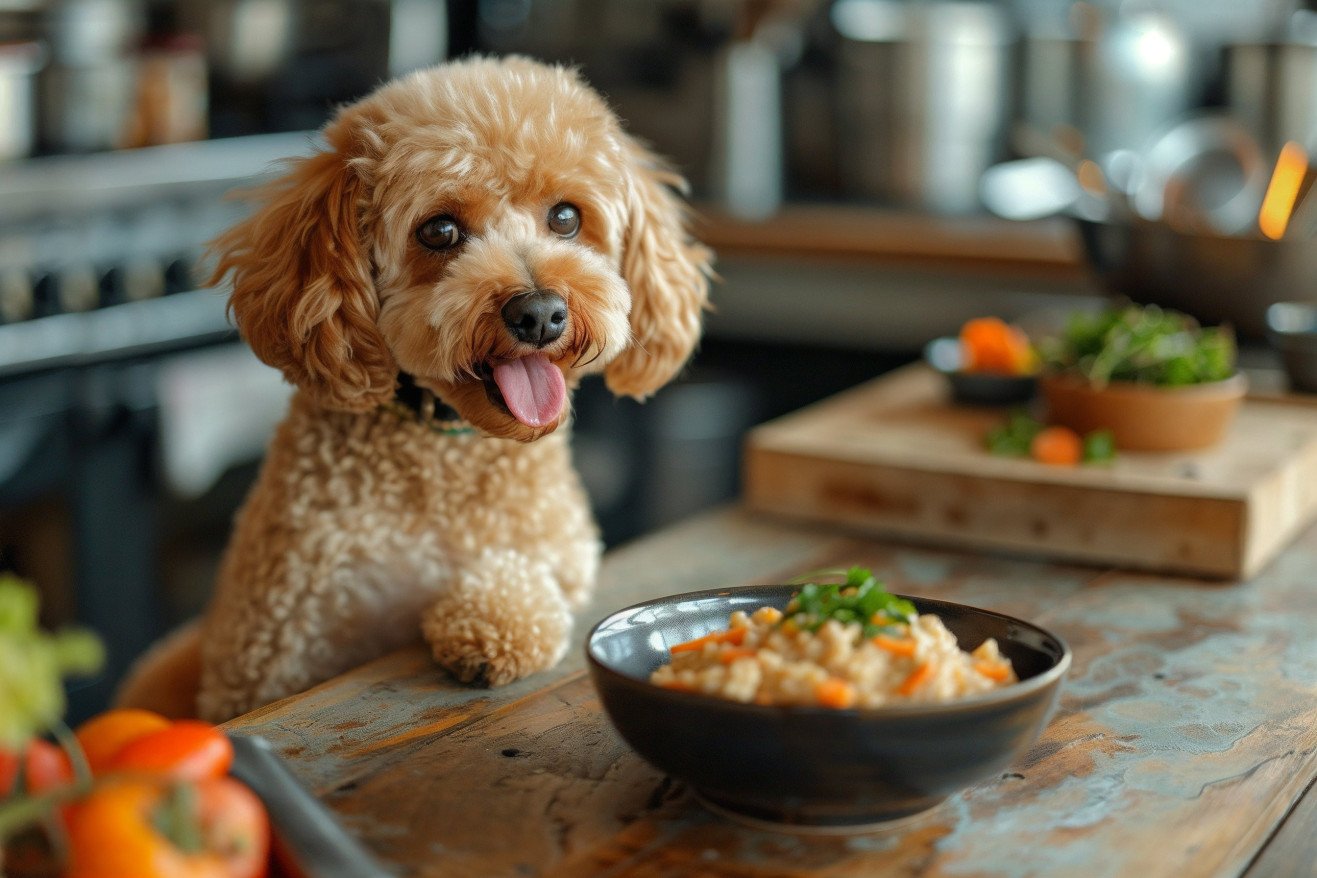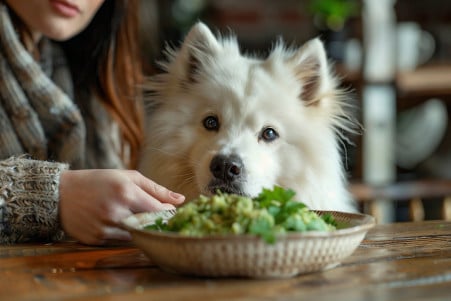Can Dogs Eat Hummus? The Dangers of Hummus for Dogs
11 February 2024 • Updated 10 February 2024

Hummus is a healthy food for people, but it’s not as safe for dogs. The presence of ingredients that are toxic to dogs, like garlic and onion, means that hummus is not safe for dogs. Even though chickpeas and olive oil are safe for dogs, the combination of ingredients in hummus, especially store-bought hummus, which often contains salt and lemon juice, can be dangerous for dogs.
This article will explore veterinary medicine and dog nutrition to explain why dogs can’t eat hummus. We’ll look at studies that have been done on the ingredients in hummus, how they affect dogs, and the science behind why dogs can’t eat certain foods.
By the end of this article, you’ll have the information you need to make decisions about your dog’s diet that are based on science, so you can keep them healthy and happy.
Can dogs eat hummus?
What Nutrients Does Your Dog Need to Be Healthy?
To be healthy, your dog needs to consume a diet that contains specific nutrients. For example, dogs need protein to repair and grow body tissues.
While dogs can synthesize some amino acids, others must be obtained from the diet. Fats, including essential fatty acids like omega-3 and omega-6, are required for energy and to maintain healthy skin and coat.
Vitamins and minerals are involved in many biological processes and are necessary for things like bone growth, muscle function, and vision. While dogs don’t have a specific dietary requirement for carbohydrates, they can be a source of energy and support digestive health if they’re included in the diet in the right way.
The Association of American Feed Control Officials (AAFCO) has established nutrient profiles to ensure that commercial dog foods provide the nutrients dogs need at different life stages and with different lifestyles. In addition, VCA Animal Hospitals notes that a healthy dog diet should be balanced and take into account the dog’s age, breed, and activity level to avoid nutritional imbalances that could lead to health problems.
Feeding dogs an unbalanced diet, like hummus, that doesn’t provide the right mix of nutrients can be detrimental to their health. This is not only about the nutrient profile but also the quality and quantity of the nutrients, which shows that while hummus is safe for people to eat, it doesn’t meet the specific nutritional needs of dogs.
Why Hummus Is Bad for Dogs
Hummus is made with a variety of ingredients, many of which are bad for dogs. For example, garlic and onions are both part of the Allium family, and according to both PetMD and the American Kennel Club, the Allium family contains N-propyl disulfide in onions and thiosulfate in garlic.
These compounds cause oxidative damage to red blood cells, which can lead to hemolysis and ultimately anemia in dogs. The resulting condition, if severe, may cause organ damage or even be fatal.
Symptoms of toxicity from these hummus components may appear within a day or more and include vomiting, diarrhea, reduced appetite, pale gums, increased heart rate, lethargy, and in more severe cases, collapse and dark urine. If you suspect your dog has ingested hummus containing these ingredients, seek veterinary care immediately. Veterinarians may treat the ingestion with induced vomiting or activated charcoal, as noted by Purina.
Recognizing the severity of these symptoms and acting promptly can be the difference between a close call and a serious health crisis for your dog. Therefore, it is essential to keep hummus and its toxic ingredients out of your dog’s reach.
What Vets Say About Dogs Eating Hummus
Veterinarians and animal nutrition experts are in agreement that hummus is not a good choice for dogs. All of the professionals we consulted noted that some of the ingredients in hummus, including garlic and onions, are toxic to dogs.
Manypets explains that garlic can cause damage to a dog’s red blood cells, leading to life-threatening anemia. Meanwhile, Fi says that garlic and onions can cause oxidative damage to a dog’s red blood cells, which can result in hemolytic anemia.
While chickpeas do provide some nutritional benefits, including protein and vitamins, the other ingredients in hummus outweigh the positives for dogs. MasterClass notes that while hummus is a nutrient-dense food for humans, the ingredients that are typically used to make it can be harmful to dogs.
While some of the ingredients in hummus may be safe in small amounts, the combination and way hummus is made does not meet the specific nutritional guidelines for dogs.
As a result, it’s important to follow the advice of these experts when planning your dog’s diet and choose foods that will have a positive impact on their health. This way, you can be sure that your dog is getting the nutrients they need without the potential dangers that come with foods like hummus.
Healthy Snack Options for Your Dog: Substitutes for Hummus
It’s important to find healthy snacks for your dog so that you can keep them happy and healthy. While hummus is not safe for dogs, there are many other options that can help your dog in a variety of ways without the potential dangers.
It’s important to remember the ‘10% rule’ with these options, which means that treats should not make up more than 10% of a dog’s daily caloric intake to ensure that they are getting a well-rounded diet.
According to Pets Domain, carrots, pumpkin, apples without seeds, and frozen sardines are all great treats that can provide vitamins, fiber, and omega-3 fatty acids. In addition, dogs can have low-fat or fat-free frozen yogurt as a probiotic treat and cooked salmon can help with their skin and coat health.
NBC News stresses the importance of looking for treats that have a clear list of ingredients and are free of artificial additives. Some of the treats that vets recommend include Zuke’s Mini Naturals and Greenies Dental Treats because they are nutritionally balanced and help with oral health.
Forbes suggests that you look for treats that are simple and natural, such as Buddy Biscuits, which are a low-calorie, crunchy option, and Pupford Freeze-Dried treats, which are great for training because they have a short ingredient list and are low in calories.
By choosing the right treats, you can make sure that your dog’s snacks are helping them live their best life.
Final Thoughts: Don’t Let Your Dog Snack on Hummus
This article has taken a deep dive into why hummus, a food that seems harmless to humans, can be dangerous for dogs.
While chickpeas are a good source of protein and fiber, the other ingredients in hummus, including garlic, onion, high salt content, and lemon juice, are not good for dogs. Both Spoiled Hounds and DogTime explain that these ingredients can lead to a variety of health problems, from an upset stomach to garlic poisoning.
We’ve also stressed the importance of knowing a dog’s nutritional needs, as explained by PetMD and the guidelines set by the Association of American Feed Control Officials. Part of being a good pet owner is making sure that the treats you give your dog are safe, healthy, and fit into their diet.
It’s up to pet parents to make sure that they’re keeping their dogs healthy by providing them with a well-balanced diet and working with their vet to make sure that they’re getting the nutrition they need.
And, as always, if you’re not sure, stick to treats and foods that are safe for dogs. If you’re thinking about giving your dog a little bit of your hummus, think again. It’s best to keep it on the human side of the table.


